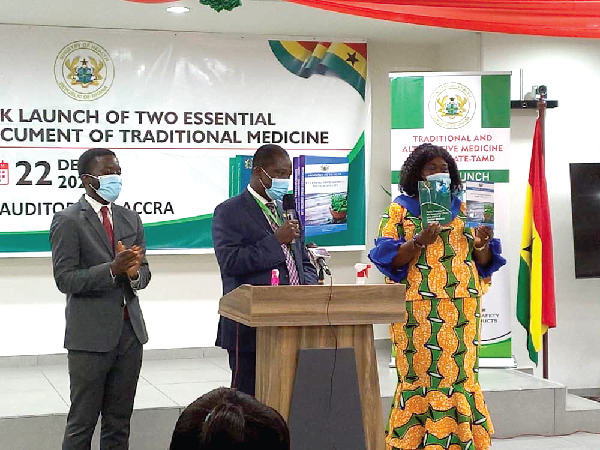
MoH launches policy documents on herbal medicine
The Ministry of Health (MoH) has launched two essential policy documents on herbal medicine to enhance the process of integrating the sub-sector into the national healthcare delivery system.
The policy documents are the MoH Recommended Herbal Medicine List and the Basic Procedure for Assessing Efficacy and Safety of Herbal Medicine Products.
In a speech read on his behalf at the launch of the two policies in Accra yesterday, the Minister of Health, Mr Kwaku Agyeman-Manu, said considering the important contribution of herbal medicine over the years, mainstreaming the sector properly into the healthcare system would improve on healthcare delivery outcomes.
He said the two policies formed part of the government’s commitment to the growth of traditional medical practice and herbal medicine.
Mr Agyeman-Manu said a further demonstration of the importance the government attached to herbal medicine was the inclusion of the two policies into the 2022 budget.
He said in the planning for the integration, institutionalisation, professionalisation and rational use of herbal medicines, it became necessary to select from herbal medicines registered with the Foods and Drugs Authority (FDA) and give market authorisation to compose the medicine list recommended for use in the management of common health conditions and the strengthening of the therapeutic domain where better medicines were required.
“Over the years, we have seen the evolution and reinvention of traditional medicine in its various forms, to play a true significant role in the delivery of healthcare in the country.
“This is not by accident, it is the result of a deliberate policy to redefine and encourage the enhancement of capacities and capabilities of various players in the sector,” he said.
Collaboration
Mr Agyeman-Manu said the government would continue to work with all stakeholders to ensure that traditional medicine in the country continued to improve to the level of attaining global recognition.
“The standardisation, efficacy and safety of herbal medicinal products have become issues of major concern for policy makers and the general population regarding their consumption and absolute reliance on it as far as people’s health is concerned.
“Although we are dealing with natural products, which in most instances are taken as food, like ‘prekese’, ‘dawadawa’, ginger among many other plant-based products, we need to understand that when we intend to use them in very large quantities, then we must make sure that the product goes through series of tests to establish quality, safety and efficacy,” the minister said.
Mr Agyeman-Manu said the development of the Basic Procedure for assessing Efficacy and Safety of Herbal Medicine Products policy was also developed to, among others, respond positively to the health needs of the population with unique products that were accessible, safe, efficacious, affordable and compatible with modern science and technology.
Progress
The Director in charge of Traditional and Alternative Medicines Directorate at the ministry, Dr Anastasia Yirenkyi, said the feat marked the progress of herbal medicines in the country.
She said the sector had made great strides over the years and the launch of the two policy documents would serve as a booster to ushering the traditional medicine sector into its next phase of practice in the country.
“The potential contribution of herbal medicine to the national healthcare system, particularly, primary healthcare delivery cannot be underestimated, especially in this era of the COVID-19 pandemic,” she said.
Dr Yirenkyi said in order to ensure rational dispensing of traditional medicines in health facilities, there was the need to prepare the recommended herbal medicine list policy document to serve as a guideline.
She said the documents would also facilitate further research into traditional medicines to contribute to the delivery of universal health coverage.
The President of the Ghana Federation of Traditional Medicines Practitioners Association, Mr William Odum Eduful, expressed gratitude to all stakeholders who contributed to the development of the two documents, particularly, Mr Agyeman-Manu.
He also agreed that the documents would enhance the use of traditional medicine for better health outcomes.
Mr Eduful, however, appealed to the minister to facilitate the inclusion of the list onto the National Health Insurance Scheme package for easy access by the population.
Writer’s email:
